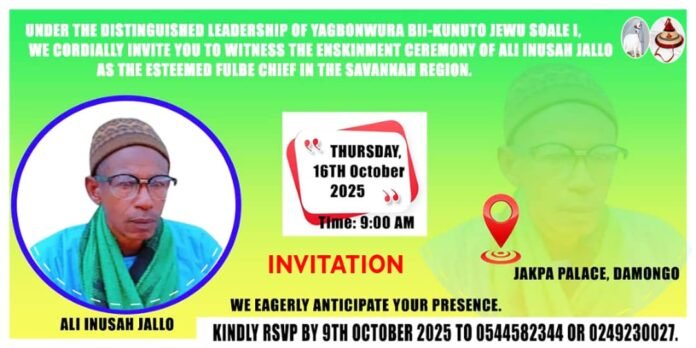Gonjaland is experiencing mounting tensions over the planned enskinment of Ali Inusah Jallo as the Savannah Regional Fulani chief, scheduled for Thursday, October 16, 2025, at the forecourt of the Jakpa Palace. The proposal has sparked heated debates within the community, particularly among youth groups, with opinions deeply divided over the implications of the appointment.
The controversy has played out prominently in online forums, including the WhatsApp groups “The Hearts of Gonja” and “GLYA OFFICIAL,” where youth have engaged in spirited discussions about the merits and drawbacks of elevating a regional Fulani representative within the traditional governance structure.
Proponents of the enskinment argue that the appointment will foster improved coordination and accountability among the Fulani pastoral community residing in the Savannah Region. They contend that the establishment of a dedicated regional chief will help curb illegal activities and address security concerns linked to Fulani herdsmen. Supporters point to precedents within Gonja communities elsewhere in Ghana, citing the successful integration of regional Gonja chiefs in Greater Accra and other areas as evidence that such arrangements can function effectively without creating complications.
However, a larger faction of youth has mounted staunch opposition to the proposal. Critics fear that granting formal recognition to a regional Fulani chief could fundamentally alter the power dynamics within Gonjaland by elevating the status of the Fulbe/Fulani people and potentially challenging Gonja authority over the land. This concern is particularly acute given recent communal tensions in the region.
Opponents cite the recent Gonja-Brifor conflict in the Gbinyiri area of Sawla-Tuna-Kalba as a cautionary tale, warning that similar disputes could emerge if the Fulbe/Fulanis gain greater institutional recognition. They argue that the current system adequately addresses grievances, with local Fulani chiefs already recognized by paramount chiefs capable of handling community disputes.
According to this view, unresolved issues can be escalated through proper channels to the Yagbonwura, the supreme overlord of the Gonja Kingdom, for final adjudication.
The opposing youth express particular concern that a regional Fulbe chief could circumvent paramount chiefs and appeal directly to the Yagbonwura, potentially creating governance complications and security vulnerabilities within the kingdom’s traditional structures.
According to reports gathered by local media outlets, the opposing youth have organized plans to stage a demonstration and petition Yagbonwura Bii-Kunuto Jewu Soale (I) to block the enskinment. The petition aims to convince the paramount ruler to reject the proposal ahead of Thursday’s scheduled ceremony.
The unfolding controversy reflects deeper questions about land rights, cultural identity, and the integration of immigrant pastoral communities within Gonjaland’s traditional governance framework. As Thursday approaches, all eyes remain on the kingdom’s paramount leadership to determine whether the enskinment will proceed as planned or whether community pressure will prompt a reconsideration of the proposal.




